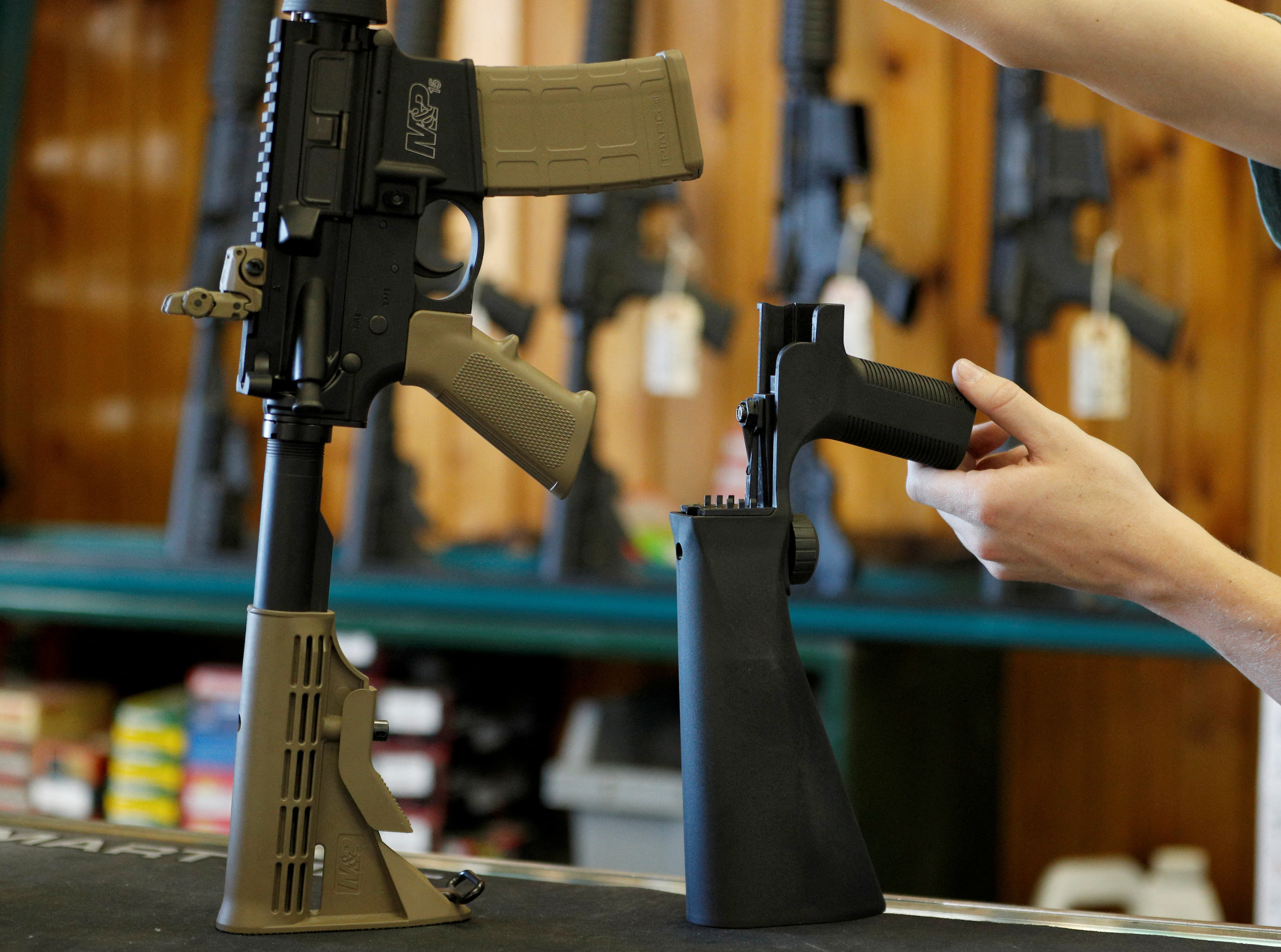
Supreme Court considers legality of “bump stocks”
PHOTO CAPTION: A bump fire stock, (R), that attaches to a semi-automatic rifle to increase the firing rate is seen at Good Guys Gun Shop in Orem, Utah, U.S., October 4, 2017. REUTERS/George Frey
By Andrew Chung and John Kruzel
WASHINGTON (Reuters) -The U.S. Supreme Court on Wednesday began considering the legality of a federal ban imposed under former President Donald Trump on "bump stock" devices that enable semiautomatic weapons to fire rapidly like machine guns in a case targeting another firearms restriction after a major gun rights expansion in 2022.
The justices are hearing arguments in an appeal by President Joe Biden's administration of a lower court's ruling in favor of Michael Cargill, a gun shop owner and gun rights advocate from Austin, Texas, who challenged the ban that was put in place after a 2017 mass shooting that killed 58 people in Las Vegas.
The Supreme Court, with a 6-3 conservative majority, has taken a broad view of gun rights, most recently in its landmark 2022 ruling striking down New York state's limits on carrying concealed handguns outside the home.
The current case centers on whether the Bureau of Alcohol, Tobacco, Firearms and Explosives (ATF), a U.S. Justice Department agency, properly interpreted a law banning machine guns as extending to bump stocks. The rule took effect in 2019.
Federal law prohibits the sale or possession of machine guns, punishable by up to 10 years in prison. Machine guns are defined under a 1934 law called the National Firearms Act as weapons that can "automatically" fire more than one shot "by a single function of the trigger."
Bump stocks use a semiautomatic's recoil to allow it to slide back and forth while "bumping" into the shooter's trigger finger, resulting in rapid fire. The devices allow a shooter to fire up to 800 bullets per minute, a rate comparable to machine guns issued to American soldiers, according to the U.S. Justice Department.
Cargill argues that the ATF exceeded its powers by impermissibly reading the statute to cover bump stocks. Unlike many other gun rights cases, this one does not involve whether the measure violated the U.S. Constitution's Second Amendment right to keep and bear arms.
The United States is a country deeply divided over how to address persistent gun violence that Biden has called a "national embarrassment."
The Supreme Court has expanded gun rights in three major rulings since 2008. Its 2022 ruling recognized for the first time that individuals have a constitutional right to carry a handgun in public for self-defense, adopting a stringent test that makes it harder for gun regulations to survive a Second Amendment challenge.
The court may soon offer clues on the new test's practical impact in a separate gun rights case, also from Texas, that the court heard last November. The justices in that one appeared inclined to uphold a federal law that prohibits people with domestic violence restraining orders from having a firearm.
After a gunman used weapons outfitted with bump stocks in the shooting spree at a country music festival in Las Vegas, Trump's administration took action to prohibit the devices.
"We're knocking out bump stocks," Trump, now cruising toward the Republican nomination to challenge Democrat Biden in the Nov. 5 U.S. election, told a White House news conference in 2018.
Cargill sued to challenge the rule, which required him to surrender his two bump stocks. He is represented by the New Civil Liberties Alliance conservative legal group.
The New Orleans-based 5th U.S. Circuit Court of Appeals last year sided with Cargill in a divided opinion, concluding that the law did not unambiguously favor ATF's reading of the statute.
The 5th Circuit's decision permits easy evasion of the machine gun ban and threatens public safety, the Justice Department said in court papers.
"Like other machine guns, rifles modified with bump stocks are exceedingly dangerous," the department said, adding that the 5th Circuit's decision could invite the legalization of more firearms long considered machine guns, including those with forced reset triggers.
Cargill's attorneys said in a brief that the shooting cycle of a semi-automatic weapon with a bump stock is "exactly the same" as one without the device, just quicker.
"But that does not convert a semi-automatic rifle into a machine gun any more than a shooter with an extraordinarily quick trigger finger," they wrote.
The justices on March 18 will hear yet another case touching on guns - a dispute over whether a New York state official stifled the free speech rights of the National Rifle Association by pressuring banks to avoid doing business with the gun rights group.
(Reporting by Andrew Chung and John Kruzel; Editing by Will Dunham)









